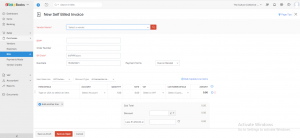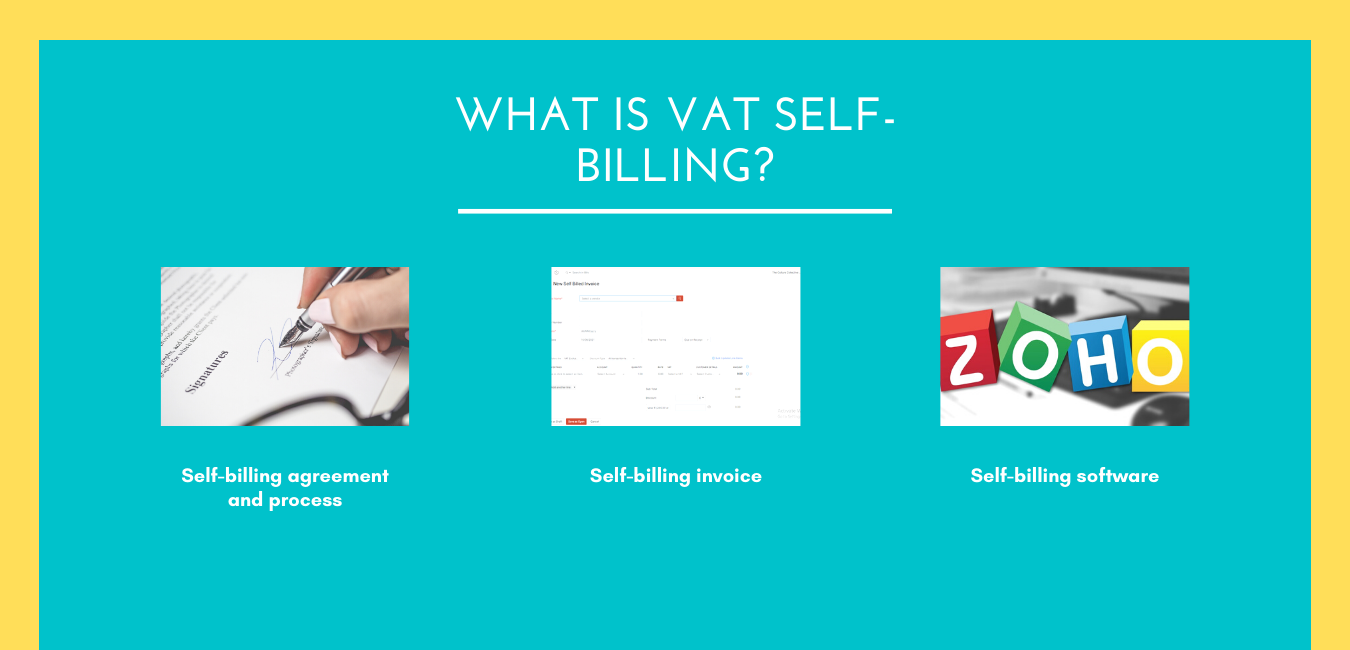What is self-billing?
Under normal circumstances, a supplier issues a VAT invoice to the client after delivering goods or providing a service. However, in some cases, the customer prepares the supplier's invoice instead and gives the supplier a copy. This kind of commercial arrangement between a supplier and customer is called a Self-Billing Arrangement.
In this arrangement, a self-biller is the customer who issues (or wants to issue) the self-billed invoices, whereas, a self-billee is the supplier whose client is issuing (or intending to) self-billed invoices.
Self-billing agreement (Download free template below)
Before starting to issue invoices under this arrangement, there must be an agreement in place for VAT compliance purposes.
We have created a self-billing agreement template below that you can use to populate with supplier and client details. The contents of this agreement can also be incorporated into your overall/main contract with your supplier, eliminating the need for a totally separate document for self-billing. However you choose to set this up, your agreement must meet the following conditions:
- Have the supplier’s consent to the self-biller raising invoices for supplies.
- Clearly state that the supplier agrees not to raise VAT invoices for supplies covered by the agreement.
- Demonstrate that the supplier will accept each self-billed invoice created by the self-biller for supplied goods or services.
- State the period for the agreement, specifying the start date and expiry date. In most instances, the expiry date will be aligned to the term of any contract between the supplier and customer.
- It needs to be legally binding for both the customer and supplier. The agreement should be in writing, either hardcopy or in electronic form.
- Be produced if asked by HMRC visiting officers.
- Include the self-billee’s agreement to tell the self-biller if they stop being VAT registered, transfer business as a going concern or become registered under another VAT number. This might be obvious, but you cannot claim VAT on a self-billed invoice from a VAT non-registered supplier.
- If relevant, it should also specify any intentions to outsource the responsibility for issuing the self-bills to a third party like an accounting firm.
Making separate self-billing agreements may not be necessary if the supplier and customer have a working business contract that covers the above criteria.
It is advisable to review a self-billing agreement (at least) yearly to ensure:
- The supplier is still VAT registered.
- Both parties are comfortable with the arrangement.
Contact Spondoo Accountants for guidance on:
- VAT self-billing agreements made with individual suppliers on different dates.
- Self-billing for less than a year
- Self-billing with no agreement set up.
Benefits/advantages of self-billing for the Customer (the Self Biller)
99% of the time the setup of a self-billing arrangement is driven by the customer, not necessarily the Supplier. The driving incentive to implement these types of arrangements is noramlly operational at its core. The benefits of setting up a self-billing arrangement for the customer are:
- Control – it makes the purchase ledger of the customer easier to manage as they control the value, timing, and accuracy of the associated invoices being received from suppliers.
- Process Uniformity - accounting staff can enforce standardised purchase ledger documentation, inputs, and processes because they can impose their self-billing process onto the customer. This can reduce the number of bookkeeping staff required to continually monitor the receipt and payment of the various invoices from suppliers. In short, a Self-Billing Arrangement can be a lot more scalable for the customers paying many suppliers under complex invoicing arrangements.
- Higher levels of accuracy & fraud mitigation - self-billing invoices can be generated from approved calculation methods, via timesheets and software that have accurate rates and days of service. They also have verified volumes and product values. This mitigates the risk of intentional or unintentional inaccuracies in the invoices.
What to watch before self-billing (disadvantages) for the Customer (the Self Biller)
For customers implementing the arrangement, there are drawbacks to consider before self-billing. These are:
- A self-biller is responsible for ensuring that the self-billed invoices raised carry the correct VAT liability for the goods or services supplied. As the Customer is not in control of the Suppliers activities, this could result in the customer incorrectly determining the VAT status of a supplier and the VATable nature of their supplies.
- The Customer is taking on more of an active role in the administration of the arrangement with their suppliers, that without appropriate scale and operational efficiencies, can prove to be a larger burden involving extra costs and time.
- A self-biller imposes risk upon themselves where they are unable to recover the VAT shown on self-billed invoices, should they fail to meet HMRC VAT Notice 700/62 conditions.
- Setting up self-billing arrangements with suppliers can be difficult and troublesome where the supply doesn't understand the arrangement in place.
- The accounting system you use might not facilitate this arrangement. You should check it meets the e-invoicing conditions and performs the assigned tasks effectively. You will have to issue paper invoices if you don’t meet the transmission and storage electronic invoicing conditions.
Benefits/advantages of self-billing for the Supplier (the Self Billee)
With the implementation of a Self-Billing Arrangement typically being driven by the customer, the benefits can be limited for the supplier. However, some of the benefits incurred include:
- Where there are complex calculations involved, there is a potential to save time as the customer takes over the responsibility for this admin work.
- Depending on the arrangement you agree to, it can result in getting paid faster.
Note – the above benefits can vary from contract to contract, so it is important to review the terms.
Disadvantages of self-billing for the Supplier
As a supplier can often be forced into a Self-Billing Arrangement as a requirement of winning a particular contract/client, it important that you know you are agreeing to in advance. We have listed below some potential drawbacks from the Supplier side of the agreement:
- You are giving up control of your own sales invoicing process, so it is important that you trust the Customer’s ability to calculate the invoices correctly.
- If there are no clear invoicing dates and timelines, the customer could potentially delay invoicing and the associated payments.
- As the customer is calculating the invoice values and associated Value Added Tax (VAT), any mistakes in VAT compliance can have a large impact on the status of the supplier. It is important to check the sales invoices being received to ensure they are correct and reasonable.
How does VAT for self-billing work?
After providing goods or services (reduced or standard rate), a supplier issues a VAT invoice to a VAT-registered customer. However for VAT self-billing, a customer creates a goods or services VAT invoice and gives the supplier a copy. A VAT invoice has specific details on the goods and services provided and is only issued when a sale is subject to sales tax.
Self-billed invoices represent the goods or services sold and the VAT applied to them. The tax generated in the self-billed invoices is the output VAT of the supplier and the input VAT of the customer.
A self-billee accounts for VAT even if the self-billed invoice is not raised including these values. A self-biller can raise self-bill invoices for multiple suppliers.
Self-billing process in a nutshell
Once the customer agrees to raise invoices for himself on behalf of the vendor, they seek approval from the supplier. They set up and sign an agreement that binds them to self-billing terms. If the timeline expires and you wish to continue with the self-billing arrangement, you need to renew the agreement.
Information required on a VAT tax invoice
A self-billing VAT invoice must have:
- A unique identifying number on the document, such as an Invoice Number
- Clearly state the date and time of the supply, considering tax point rules for VAT
- The date the invoice was made available to the supplier
- The self-billers name, address, and VAT registration number
- Self-billee’s name, address
- A clear description of the goods or services supplied. For supplied goods, you may use a verifiable code to identify products like a catalogue, SKU, or product code
- The unit price for each good or service
- The quantity of the goods or the extent of the services
- VAT rate and code being used
- The amount payable including and excluding VAT
- The rate of cash discount offered, if applicable
- The total amount of VAT chargeable, in sterling
- A summary of the VAT amount payable on the invoice by VAT rate or exemption
Self-billing rules for self-billers (customer)
A self-biller should:
- Create self-billed invoices for all transactions with the supplier named on the document within the agreement (or contract) timeframe.
- Set up a new self-billing agreement if your supplier transfers their business and you intend to continue with the arrangement.
- Complete self-billed documents with all the details that make up a full VAT invoice.
- Maintain the names, addresses, and VAT registration numbers of the suppliers with whom you have self-billing agreements. You should also readily produce the supporting evidence for HMRC inspection when requested.
Check if your supplier's VAT number is registered online on ‘Check a VAT number online service’.
A self-billed invoice does not create a tax point like when a supplier issues its VAT invoice. The normal tax point rules stipulated in the VAT Notice 700: the VAT guide applies to self-billed invoices and input tax is claimed on a self-billed invoice according to the tax point period. The Notional tax point is usually the day after the issuance date of the self-bill invoice.
Self-billing rules for self-billees (supplier)
A supplier must:
- Agree to accept the invoices you raised by the self-biller on your behalf within the period agreed.
- Notify your customer should your VAT registration status change.
- Avoid raising sales invoices for any transactions with your self-billing customer within the period of your self-billing agreement.
Best Accounting Software for Self-Billing
Some accounting software simplifies the Self-Billing processes by automating invoice creation and submission. Choose accounting software that:
- Is VAT compliant
- Meets all the HMRC stipulated rules and conditions for electronic transmission under Masking Tax Digital (MTD)
Here is an example using Zoho Books

To create a self-billed invoice on ZOHO Books, go to Purchases > Bills > Down Arrow next to '+New'> Click Create Self Billed Invoice> Fill in the required details> Click Save as Open or Save as Draft.
Other accounting software like Xero, QuickBooks, Capium, Sage, and Kashflow can all handle Self Billing, although, unlike Zoho, most do not provide specific functionality to do this. Instead, you can speak to our expert accountants to help you set up your chosen software to handle a Self-Billing Arrangement.
Are you looking for guidance and support on VAT self-billing invoices in and out of the United Kingdom? Contact Spondoo accountants for clarity and peace of mind.


